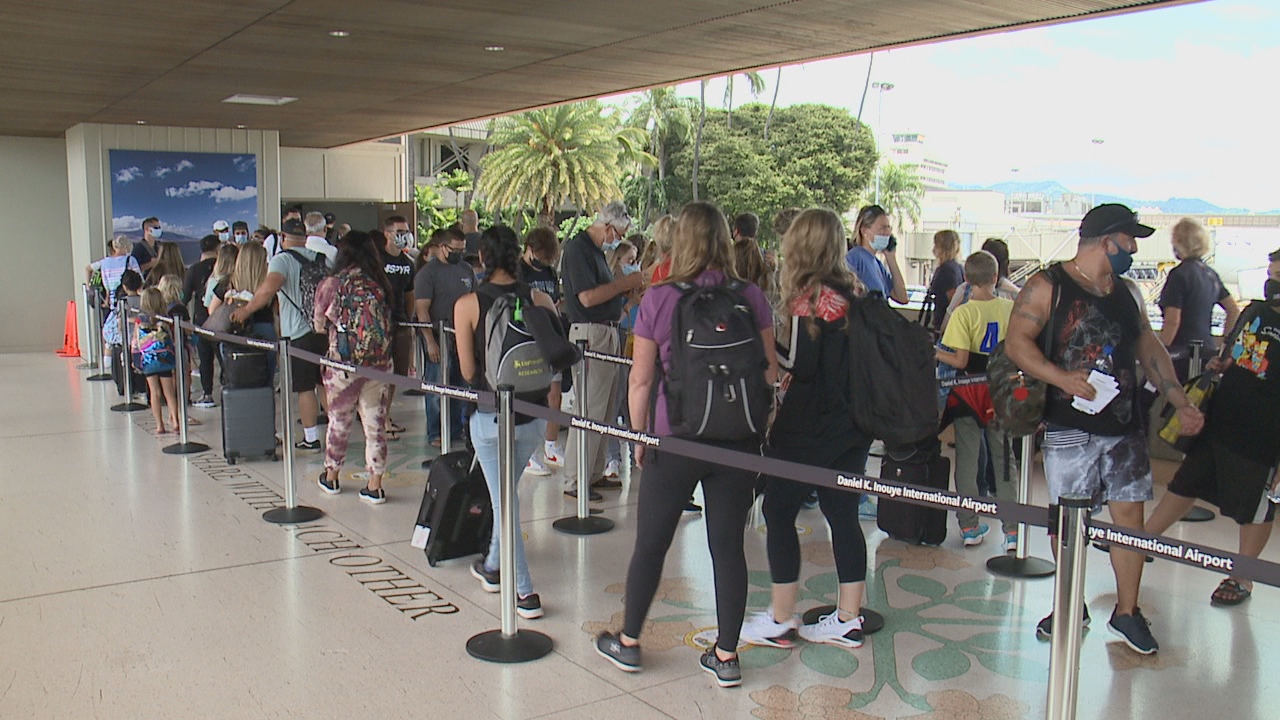HONOLULU (KHON2) — The Hawaii Department of Health (DOH) reported 707 new infections on Saturday, Dec. 18, and three deaths.
The state’s positivity rate reached 5% on Saturday for the first time since Sept. 23 when the state started seeing a decline in cases from the summer delta surge.
Get news on the go with KHON 2GO, KHON’s morning podcast, every morning at 8
Now, the state is averaging more than 350 cases a day.
Some health officials believe cases will reach the thousands before 2021 is over and said more needs to be done before hospitals reach capacity.
The delta and omicron variants continue to spread across Hawaii, and Dr. Scott Miscovich, Premier Medical Group founder, said Saturday the state is not preparing fast enough.
“The worst-case scenario is here, it’s starting already as we’ve seen our number surge into the 700s. There is nothing we have done and nothing that was changed by the governor and the mayor’s [Friday] to address what the problems are. Therefore, we are now going to then face the omicron variant on top of the delta variant with doubling every one and a half to three days, which is going to create a surge that most of us are predicting now that we’re well into the 1,500 to 2,000 a day range by virtue of end of January — if not sooner.”
Dr. Scott Miscovich, Premier Medical Group founder
A study released from the Imperial College London stated there is no evidence yet that omicron is milder than delta because hospitalization data remains limited.
On Saturday, Dr. Miscovich also mentioned the United Kingdom said it predicts a surge in hospitalizations soon and that is it dangerous to tell people omicron is ‘mild.’
“The biggest factor that we need to talk about is waning immunity — prior to omicron — even coming up, we already knew that six months after your vaccines with Pfizer, or Moderna or J&J, you were already only 50% immune. So, that’s our real problem,” Dr. Miscovich added.
He said that makes the vaccinated population vulnerable to catching omicron, which has already proven to evade vaccines, which is why health officials have been urging people to get their boosters.
“Now, the vaccinated individuals are at risk, and we’re only at 21% of our state is fully vaccinated, and fully vaccinated should mean three shots right now. So, we are close to 80% of our population is at risk,” Dr. Miscovich continued.
To help ease a potential surge, he said reducing capacity at bars, restaurants and large gatherings needs to happen as soon as possible.
“Let’s do some enforcement too, I am getting so many photos and videos of what the bars and restaurants look like in the large gatherings. It’s chilling to see so many people together, no masks on.”
Dr. Scott Miscovich, Premier Medical Group founder
He said Safe Travels should also consider being fully vaccinated as including the booster shot, something Gov. David Ige said on Friday he has not considered because he is following CDC guidance.
People who test positive for COVID-19 are reminded to stay home and isolate for 10 days, as well as let close contacts know they have tested positive.
“Be proactive and take steps, don’t wait until somebody calls and says ‘hey, you need to stay home. Be a responsible community member and stay home,” said Tellie Matagi, DOH’s lead contact tracer.
She said contact tracers face a lack of cooperation and that timely information is important, especially if a close contact has an underlying health issue.
“So, if you’re withholding that information and family members or co-workers are thinking, ‘oh, it’s just the flu, I don’t need to worry about it,’ that delay in treatment is an issue for them because it could be the difference between them going home and being OK or them ending up in the hospital,” she explained regarding the importance of treatments like monoclonal antibodies.
For more information on what to do if you test positive, click here. If you are a close contact and need more information, click here.
Close contacts should get tested three to five days after possible exposure and isolate until their results come back.
For families who live in multi-generational housing, she said to stay away from loved ones, wear a mask around, clean commonly touched areas and clean the bathroom regularly.
Find more COVID-19 news: cases, vaccinations on our Coronavirus News page
On Friday, state health director Dr. Libby Char recommended everyone come up with a plan should they contract the coronavirus and figure out a way to get items like groceries brought to you.
